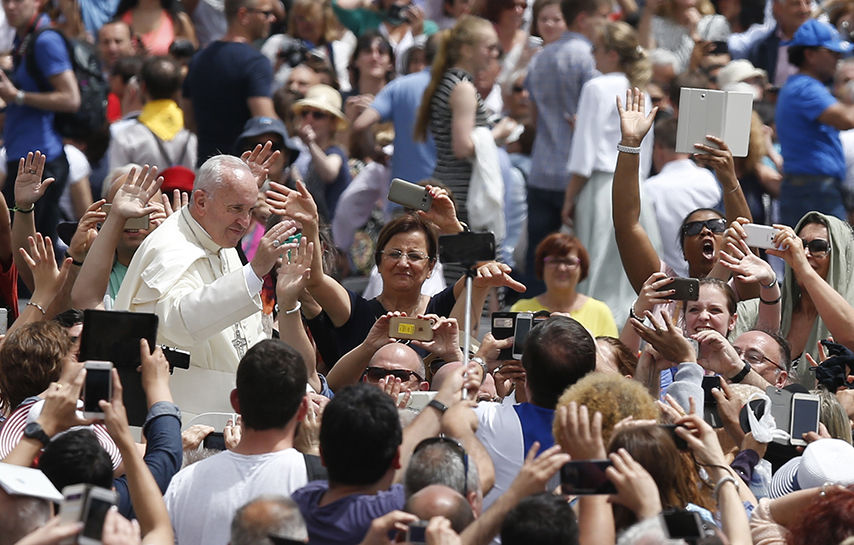During his customary in-flight news conference at the end of his trip to Sweden Oct. 31, Pope Francis took a question on women priests and not only reiterated, as he has several times in the past, that St. Pope John Paul has already said no, but he appeared to suggest that the Church’s “no” is forever.
“If we read carefully the declaration of St. John Paul II, it goes in that direction,” Francis said.
What that response didn’t address, however, is the more interesting question currently percolating about women clergy, which is the matter of whether women can, and should, be ordained as deacons. I say it’s more “interesting” largely because Francis’ answer is less predictable and therefore the outcome is more up for grabs.
I don’t know how to handicap where the pope will come down on the issue, but I do know where to begin in trying to describe how he’s likely to approach it: What he sees as the “disease” of clericalism and the danger of clericalism setting the tone for discussions of women in the Church.
Despite the fact that he stands today at the apex of the clerical pecking order, there’s a sense in which Pope Francis is the most anti-clerical pontiff in Catholic history. His jeremiads against clerical power and privilege have become the stuff of legend, and one has the sense when he uses the word “clericalism” that he’s virtually talking about the sin against the Holy Spirit.
When Francis traveled to South Korea in August 2014 and discovered that the faith had arrived there not through priest-missionaries but lay scholars visiting China, and that small Catholic communities flourished for more than a century before the first resident priest arrived, he lit up and has never stopped extolling Korea ever since as a model for lay leadership and enterprise.
Lest it be considered flippant to describe Francis in these terms, let it be recalled what while we were in South Korea, the Vatican spokesman at the time, Jesuit Father Federico Lombardi, smilingly characterized him as “a little bit of an anti-clerical pope.”
As part of his aversion to a form of ecclesiastical culture that sees clergy as more worthy or noble than everyone else, Francis has voiced deep skepticism about proposals to empower women in the Church that he would regard as effectively clericalizing them.
Back in December 2013, speculation was on the point of going viral about whether Francis might name a woman as a “lay cardinal,” reviving an earlier tradition. (In fact, the term is somewhat misleading, since all the laymen named cardinals in the past were given first tonsure, which at that time meant one had entered the clergy.)
In any event, Francis was asked in a December 2013 interview with Vatican Insider if he were open to the possibility, and this was his response.
“I don’t know where this idea sprang from,” he said. “Women in the Church must be valued, not ‘clericalized.’ Whoever thinks of women as cardinals suffers a bit from clericalism.”
That, in a nutshell, is what makes it so difficult to anticipate how Pope Francis will eventually resolve the debate he himself has beckoned over women deacons.
As is by now well known, last May Francis held a Q&A session with the International Union of Superiors General, the Rome-based umbrella group for superiors of women’s religious orders around the world. One of the sisters in attendance proposed to the pope that he consider creating a commission to look into the idea of women deacons, and he agreed.
A brief flurry of speculation followed about whether the pope simply meant that his commission would look into the role of women in the ancient Church referred to as “deaconesses,” or whether the panel would consider possibilities in the here-and-now.
That was basically resolved when the Vatican announced the composition of the commission in August, with 12 members representing a variety of theological perspectives, including one, American scholar Phyllis Zagano, whose advocacy of women deacons is well known. Obviously, Francis wanted to hear arguments not just about the past, but the present.
Further, Pope Francis repeatedly has said that he wants to see a “greater role” for women in Catholicism, including participation in the “important decisions … where the authority of the Church is exercised.” Clearly, creating the possibility of participation in the diaconate would be one highly visible way of accomplishing that.
Yet there’s also the nagging point that doing so might strike the pope as reinforcing the idea that the only way to matter in Catholicism is to be part of the clergy.
Over the last three-and-a-half years, there have been times when Pope Francis launches a conversation in the Church with a seemingly pre-formed conclusion in mind about where he wants it to go. Such was the case with his two-Synods of Bishops examination of the family, which he knew going in would focus in part on the question of Communion for divorced and civilly remarried Catholics, and where he appeared from the beginning to want the answer to be some form of “yes.”
In the end, “yes” is the answer he essentially gave in Amoris Laetitia, albeit in a slightly ambiguous form that left latitude for bishops and pastors to exercise their own judgment.
In other areas, however, it sometimes seems Francis has a sense that some issue or theme in the Church is important, yet doesn’t have a fixed position on what to do about it, and therefore simply kick-starts a conversation to see where it might end.
Time will tell which of the two is the case with women deacons, but for now it seems the smartest move for pope-watchers is to hedge their bets, because how Francis may come down hardly seems a slam-dunk.

